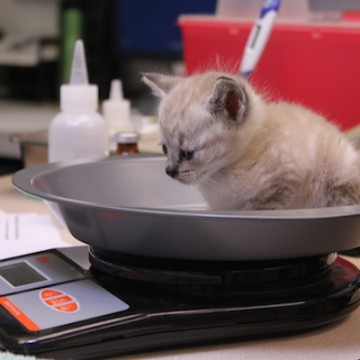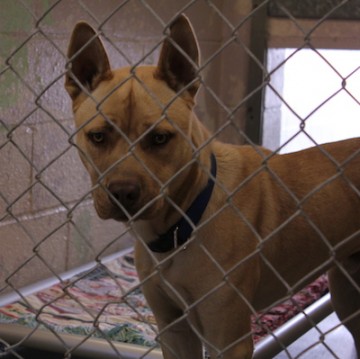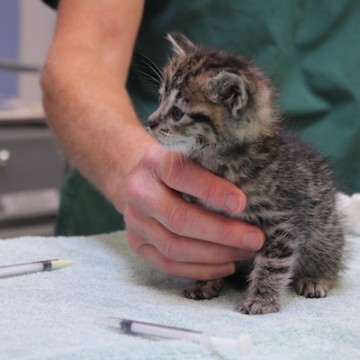Animal Shelter Struggles With ‘Unhealthy and Untreatable’ Pets
Monday, September 15, 2014
The Multnomah County shelter takes kittens that are too young for the Oregon Humane Society. Photo by Emily Liedel
A review of numbers from the Animal Shelter Alliance of Portland (ASAP), a coalition of private and public shelters, shows that Multnomah County Animal Shelter accepted the largest portion of animals deemed “unhealthy and untreatable,” a designation that applies to dogs and cats with serious health-related or behavioral problems.
Around 13 percent of the dogs and 20 percent of the cats that entered the Multnomah County Animal Shelter in 2013 were classified “unhealthy and untreatable.”
By comparison, only 1 percent of the dogs and 3 percent of the cats that entered the Oregon Humane Society’s Shelter in the same time period were in that category.
Multnomah County must, by law, accept all animals in its jurisdiction, including stray animals, dogs under investigation for aggressive behavior – including those that have injured people and animals with health problems. Private shelters, on the other hand, can pick and choose which animals to accept, only taking those animals they consider “adoptable.”
“I think there is no question that the county shelters, Multnomah County especially, is charged with the burden of handling sick or injured, emergency animals, last-chance animals,” said Amy Sacks, executive director of the Pixie Project, an animal adoption and rescue center not affiliated with ASAP. “I definitely think it's a problem.”
Other experts agree, saying the problem is widely understood, but rarely discussed in public.
Cramped conditions
The county shelter sits in a 1960s-era building in Troutdale, at the entrance to the Historic Columbia River Highway. The steady hum of traffic on I-84 can be heard from the shelter’s front door as dogs periodically erupt in fits of barking.
On one side of the building is a wing for recently arrived dogs who were either picked up as strays or, in some cases, are being held pending an investigation for biting.
Owners ultimately recover about 58 percent of dogs that come in to the shelter. The high recovery rate means that space is rarely an issue for dogs.
Cats are another story. Cats in cages line the hallways and offices.
Across from one stack of cats is a large bulletin board with photos of some of the county’s adoptable animals, which include a hen and a snake.
Outside is a pen for livestock such as chickens, pigs and goats. Animal Services Director Mike Oswald eagerly pulled up some photos of a black pig that had been there recently. The county contracts with a stable in Gresham for larger animals such as horses or cattle.
In the hospital section, two staffers weighed and dewormed four new kittens. Each kitten weighed between 8 and 10 ounces and was about two and a half weeks old. They will have to be bottle-fed for at least week. Kittens like these fall into the “unhealthy and untreatable” category, because they will die without intensive care.
“Most shelters won’t take these kittens,” Oswald said.
Oswald estimates that the shelter took in around 1,000 underage kittens last year. The OHS won’t accept cats that weigh less than 2 pounds.
“They do selection at admission,” explained Oswald. “We don’t do that.”
Different Missions
Dogs tend to get united with their owners quickly. Photo by Emily Liedel
Last year, 10,375 pets were adopted from the OHS, while about 1,551 pets were adopted from the county shelter.
She notes the OHS has a different goal than public shelters.
“Oregon Humane Society only takes in a few of those [sick pets] because they know they won't get adopted as fast,” she said.
In the '70s and '80s, the Humane Society took any dog or cat brought in. In the early 2000s, however, the group took measures to control the flow of pets, such as requiring people to schedule appointments.
‘Hotel for Animals’
Barbara Baugnon, communications director for the OHS, said that she hasn't heard of any problem with the roles that the county and her organization have assumed.
Baugnon compares OHS’s 14-year-old building on Columbia Blvd. to a hotel for animals. There are no cats stacked in the hallways because new animals, or “guests,” are admitted only when the old ones check out.
“Any pet with a history of aggression would not be accepted into our program,” she said.
OHS only accepts animals surrendered by their owners, who must make an appointment to drop off their animal. The wait for an appointment can be under a week or as long as two months.
The average stay for a dog was 10 days, and 14 days for cats. Baugnon said OHS brings animals from the Dalles, Eugene and even northern California to adopt out in Portland.
Public and Private Resources
Young kittens require intense care. Photo by Emily Liedel
The nonprofit has a $1.5 million annual budget for community awareness, according to IRS documents. The budget includes cash, donations and volunteer hours and funds billboards, education, media advertising and events.
The county shelter labors in relative obscurity in its remote Troutdale location, with just one person dedicated to public awareness campaigns.
“We love Troutdale, but only so many people live in Troutdale,” Oswald said. “Our location is really a problem.”
He added that even for people who have lost a dog and know it's at the shelter, making the trip can be a major obstacle, especially if they don’t have a car. The closest bus stop is half a mile away.
That said, the shelter has a remarkable rate of survival and is regarded by many as a model operation. That fact is evidenced in the exceptionally high survival rates of the animals that come through the shelter.
Nationally, approximately 50 percent of the animals who enter an animal shelter are euthanized, according to estimates by the American Humane Association.
At the county shelter the live release rate is 87.4 percent.
“No healthy animals have been euthanized here for years,” Oswald said, adding, “Just because they’re unhealthy and untreatable doesn’t mean they can’t have a good outcome.”
Related Articles
- Charity Rescues Hawaii’s Homeless Pets and Flies Them to Portland
- Five Years On, Westside Commuter Train Bleeds Cash
- 50 Biggest Stars Born, Raised, Have Lived or Are Currently Living in Oregon
- The 10 Worst Reasons to Move to Portland







Follow us on Pinterest Google + Facebook Twitter See It Read It